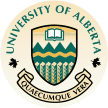
INTRODUCTION TO EVALUATING EDUCATIONAL RESEARCH
Fall 2003
Location: Education South 177

|
INTRODUCTION TO EVALUATING EDUCATIONAL RESEARCH Fall 2003 |
|
Location: Education South 177 |
| Department
of Educational Policy Studies |
Instructor: Margaret Haughey Office: 7-113 (Education North) Tel.: 492-7609 E-mail: margaret.haughey@ualberta.ca |
| If you would like an appointment, you can leave a message on the answering machine or a note on my door but the best way is to e-mail. Let me know your availability so we can arrange a time. If you have an immediate query, e-mail and I will get back to you asap. |
| Rating | Grade | Recommended grade distribution |
| Excellent | A+, A, A- | 40% |
| Good | B+, B | 33% |
| Satisfactory | B-, C+ | 22% |
| Unsatisfactory | 5% |
| University Policies |
| Please note you are required to follow the University guidelines concerning |
| Copyright (www.library.ualberta.ca/copyright/index.cfm) |
| Inclusive language (www.education.ualberta.ca/ed/L35/EQRSintro) |
| Plagiarism and Cheating (www.ualberta.ca/~unisecr/appeals.htm) |
| 1. Field work | 50% |
| 2. Group discussion | CR 10% |
| 3. Article review | 25% |
| 4. Application for Funding | 15% |